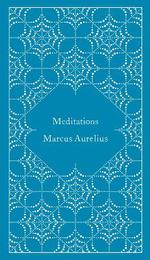
|
Meditations
Hardback
Main Details
Description
Pocket Hardbacks - the new non-fiction series that combines the collectability of Clothbound Classics with the popular spirit of Great Ideas Written by an intellectual Roman emperor without any intention of publication, the Meditations of Marcus Aurelius are the spiritual reflections and exercises developed as the leader struggled to understand himself and make sense of the universe. Today these simple, practical aphorisms continue to offer guidance and consolation to many with their eloquence, wisdom and humility.
Author Biography
Marcus Aelius Aurelius Antoninus, 121-180. was adopted by the emperor Antoninus Pius and succeeded him in 161 (as joint emperor with adoptive brother Lucius Verus). He ruled alone from 169. He spent much of his reign in putting down variou rebellions, and was a persecutor of Christians. His fame rest, above all, on his Meditations, a series of reflections, strongly influenced by Epictetus, which represent a Stoic outlook on life. He died in 180 and was succeed by his natural son, thus ending the period of the adoptive emperors. Diskin Clay is Professor of Classical Studies at Duke University and has published widely in the area of Ancient Greek Philosophy. Martin Hammond is Head Master of Tonbridge School and has translated Homer's Iliad for Penguin Classics.
ReviewsMartin Hammond's translation of Marcus Aurelius' Meditations, like his Iliad and Odyssey, is the work of an unusually gifted translator, and one who understands the value added by careful attention to supplementary material. He writes natural English, direct and often eloquent; the text is well supported by effective notes and a characteristically thorough and well-planned index; Diskin Clay supplies a useful introduction. This is a fine volume -- Malcolm Heath * Greece & Rome Journal * Marcus is well served by this new translation. Hammond has a pithy turn of phrase to match the emperor's own . . . His notes abound in helpful explanation and illuminating cross-reference. Diskin Clay contributes a sparkling and sympathetic introduction. The combination of introduction, translation and notes is as good as they get -- John Taylor * Journal of Classics Teaching *
|